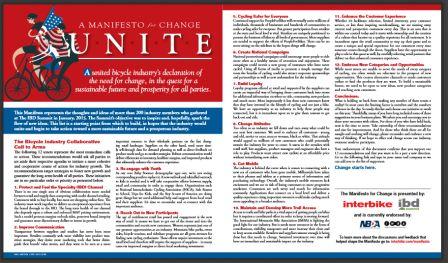The Bicycle Product Suppliers Association (BPSA) advised its members to consult with attorneys before endorsing a “Manifesto for Change” circulated by Interbike last week.
The Manifesto represents the thoughts of more than 200 industry members who gathered in Phoenix in January to attend Interbike's IBD Summit, an conference that aims to inspire news ideas for growing the bicycling industry. Interbike published the 12-point Manifesto on its site March 23 and has been inviting industry members to fill out an online form to show their support. As of March 26, about 75 people had done so, according to Justin Gottlieb, director of communications and PR for Interbike and IBD Summit. Gottlieb said the summit doubled in size over last year due to the January date.
The Manifesto's preamble describes it as “a declaration of the need for change, in the quest for a sustainable future and prosperity for all parties.” It's first tenet, however, calls for a “robust and enforced MAP pricing environment,” which is non-starter for NBDA, according to an email the association sent to its members March 23.
 MAP is an acronym for “minimum advertised pricing,” a policy many premium outdoor, cycling and other sporting goods brands use to discourage dealers from advertising premium products at deep discounts. They have become more popular in recent years as Amazon and other online sellers have used pricing algorithms to set their own prices according to the lowest prices advertised online.
MAP is an acronym for “minimum advertised pricing,” a policy many premium outdoor, cycling and other sporting goods brands use to discourage dealers from advertising premium products at deep discounts. They have become more popular in recent years as Amazon and other online sellers have used pricing algorithms to set their own prices according to the lowest prices advertised online.
While MAP policies are allowed by most U.S. states, they are banned in Europe and subject to scrutiny by U.S. antitrust regulators. To avoid running afoul of state and federal antitrust laws in the United States, legal experts advise manufacturers to impose MAP policies unilaterally with no input from their dealers to avoid the appearance of collusion.
“While we can and will vigorously support many of the efforts highlighted in the recently released 'Manifesto for Change' that emerged from the IBD Summit,” BPSA Executive Director Ray Keener wrote in the email, “we cannot endorse the full document due to its reference to certain business strategies and decisions – on matters such as pricing policies, supply channels, inventories, and margins – that are better left to the discretion of independent businesses than to agreements among groups of companies in an industry. If your individual companies are considering endorsing the Manifesto, we advise you to seek the advice of your own counsel.”
Gottlieb told The B.O.S.S. Report Interbike saw no reason to run the Manifesto by lawyers as it is simply a compilation of the ideas and thoughts that surfaced during the IBD Summit.
“It was created to put a spotlight on the concerns of the attendees, with the hopes that it would instigate change in our industry because when businesses and industries don’t proactively evolve or change with the times, change will inevitably happen and it may not be pretty for all involved. Our interest is in helping to grow our business, prevent the flat-to-steady decline in participation, and help ensure the health of the IBD, manufacturers and distributors that make our industry tick,” they said.
Interbike is owned by Emerald Expositions, which also owns the Outdoor Retailer trade shows, where the need for MAP enforcement has also been a hot topic of discussion between retailers and brands.
Keener's email came just three weeks before BPSA's annual Bicycle Leadership Conference, which draws both manufacturers, dealers and other industry leaders to Monterrey, CA, every April. When discussions drifted to MAP policies and enforcement during a panel discussion at last year's conference, BPSA's legal counsel was quick to raise his hand to repeat the BPSA's neutrality on MAP.









